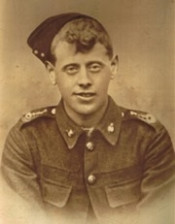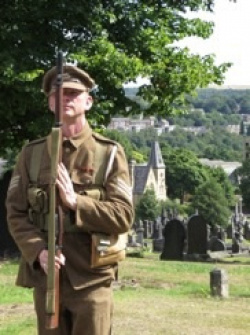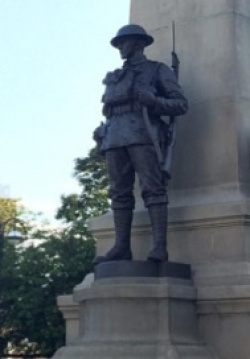The forgotten ones

The eleventh hour of the eleventh day of the eleventh month. Traditionally the world goes silent. The traffic stops. There may be salvos from field guns. Traditionally, the great and the good stand solemnly bareheaded at cenotaphs and memorials to the Fallen of two world wars whose feet are bedecked with wreaths of scarlet poppies.
The fallen. It’s an achingly resonant phrase. Their names are inscribed in every town and village, not just here in Britain, but throughout France, all across Europe and beyond, like the astonishing, heartbreaking memorial at Vimy Ridge. Thousands and thousands of names. All of them soldiers, sailors, airmen. And then there are the haunting acres of white crosses for those with no recorded name at all. Unknown soldiers.
I see now that there are different coloured poppies to commemorate the animals, conscripted and killed. We care for horses, too. Does it not seem remarkable that there are apparently no memorials for the others. The mothers and fathers and children of the fallen. The women especially; the wives, the daughters, the sweethearts and the fiancees.
I started writing a regular Armistice Day piece a few years ago for the memory of my grandfather Alfred, my mother’s dad. For decades I genuinely believed I’d been told he was killed in action, later that he’d been invalided to an army hospital in Aldershot where he died. Believing this I wrote a poem for him.

There he is. Grinning and unsoldierly,
the despair of the RSM. The joker in the trench.
Except, I’ve no way of knowing if he ever was.
Maybe, Ypres and Mons and Passchendaele
meant no more to him than Chapel hymn tune names –
O dass ich tausand zungen haite. Armageddon.
But all the same, a bit of a lad. No more than a lad,
father of four, and husband of (I think)
a small girl, left all alone to scrat and fend.
My grandma, Ethel, who went deaf, who sat
with her head in the swelling horn
of the wind-up gramophone.
Listened to the scratchy tinnitus
of brittle shellac records until
they hissed like the sea on a shingly shore.
Who drowned herself, a poor Ophelia,
In the beck that ran hot from dyehouses,
that ran blue and plum and crimson red.
Who died (I think) wreathed in bindweed,
those wide white silky flowers,
and the pink of balsam, sour as a sink
Four years ago, a society in my home town of Batley contacted me. They work tirelessly to commemorate the the centenary of the death of every Batley serviceman during the first world war. And from them I learned the true story ... that he was an enthusiastic soldier, a sergeant in the Territorials, who would have happily gone the the front had he not fallen ill of Hodgkin’s lymphoma, and died in a hospital in Chapel Allerton in Leeds. Everything I thought or believed I knew about him was wrong … apart from the fact that he left a widow to bring up four children, all under 11, without benefit of pension or state support. It seemed very odd to go to a quiet and moving ceremony at the cemetery overlooking the mill where all my relatives had worked, and the chapel where all of them were christened, some were married, and many were buried from. It seemed very strange to stand by the austere grave plot where he and his wife Ethel are buried.

That’s the wisdom. You can’t
step in the same river twice.
Where’s the bank, my chapel,
where’s the fire station?
Its plinth’s knocked skew
by a clumsy tractor mowing grass
but my grandparents’ grave
is where it always was, not vandalised.
Alfred’s been dead a hundred years
today. An actor’s dressed
in a sergeant’s uniform,
a faithful replica of everything
but mud, sweat, lice,
rips from snarls of wire,
fumbled stitches, burns, blood.
The rifle’s spotless. Never fired.
And all this is accurate.
Alfred never saw The Front,
knee-deep slurry trenches,
never trudged through Picardy
watching men and horses drown.
His uniform was always drill-hall smart.
Going back is fine, today .
The Chapel of Rest a museum
where reverence is on display
like something solid people
used to do, when the air was thick
with mill-smoke, lanolin, temperance.
And that might have been it; a poem to draw a line, except there’s still barely a poem for Ethel and the millions like her. So when I was writing a piece recently about the poetry of David Constantine, I felt blessed when I read this poem about his grandma (whose husband did go to the front, and died there). I wish I could have written it. I think it should be read at every war memorial and every church service instead of Rupert Brooke and Laurence Binyon. A poem for the army of unknown women who kept going. Never forget the men, but remember their womenfolk, too. Light a candle for them.

We need another monument. Everywhere
Has Tommy Atkins with his head bowed down
For all his pals, the alphabetical dead,
And that is sweet and right and every year
We freshen the whited cenotaph with red
But no one seems to have thought of standing her
In all the parishes in bronze or stone
With bags, with heavy bags, with bags of spuds
And flour and tins of peas and clinging kids
Lending the bags their bit of extra weight –
Flat-chested little woman in a hat,
Thin as a rake, tough as old boots, with feet
That ache, ache, ache. I’ve read
He staggered into battle carrying sixty pounds
Of things for killing with. She looked after the pence,
She made ends meet, she had her ports of call
For things that keep body and soul together
Like sugar, tea, a loaf, spare ribs and lard,
And things the big ship brings that light the ends
Of years, like oranges. On maps of France
I’ve trailed him down the chalky roads to where
They end and her on the oldest A to Z
Down streets, thin as a wraith, year in, year out
Bidding the youngest put her best foot forward,
Lugging the rations past the war memorial.
David Constantine
from The pelt of wasps 1998




